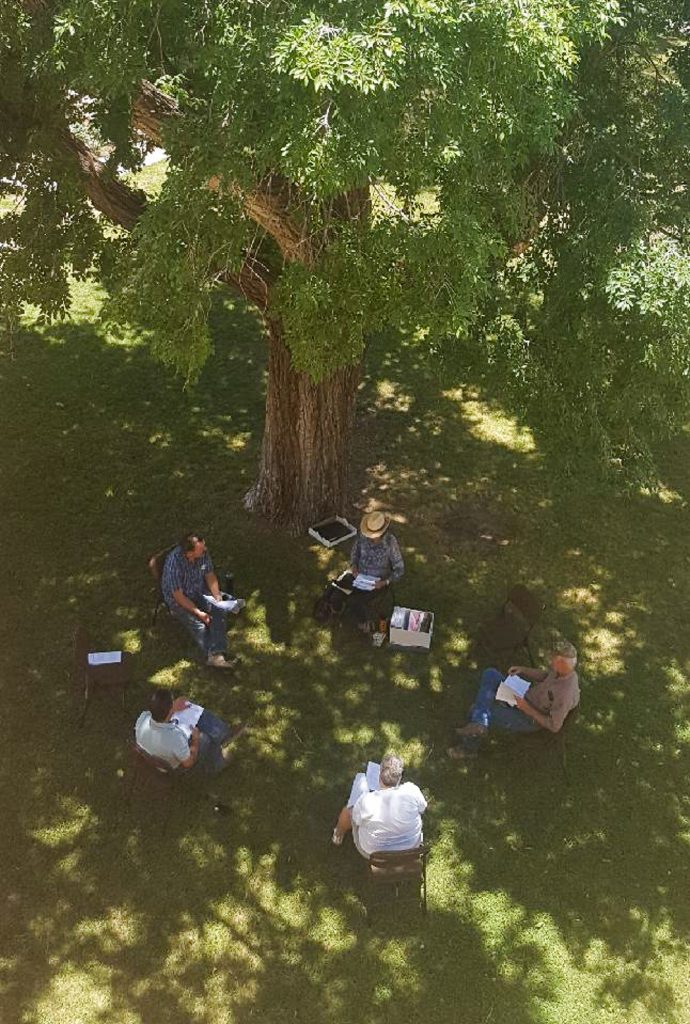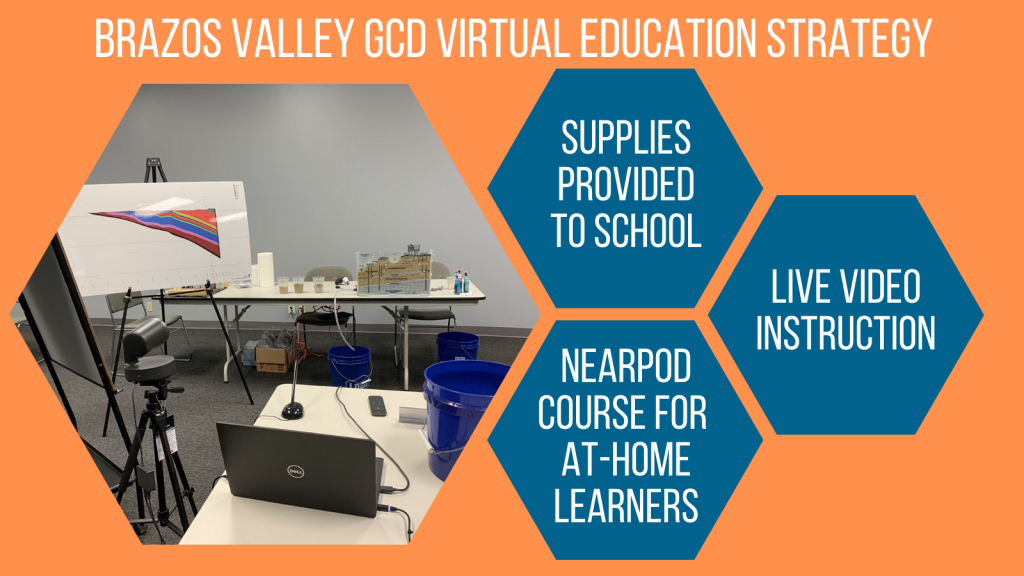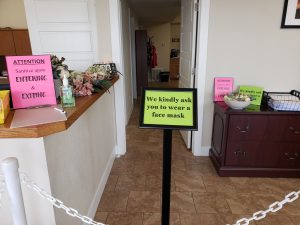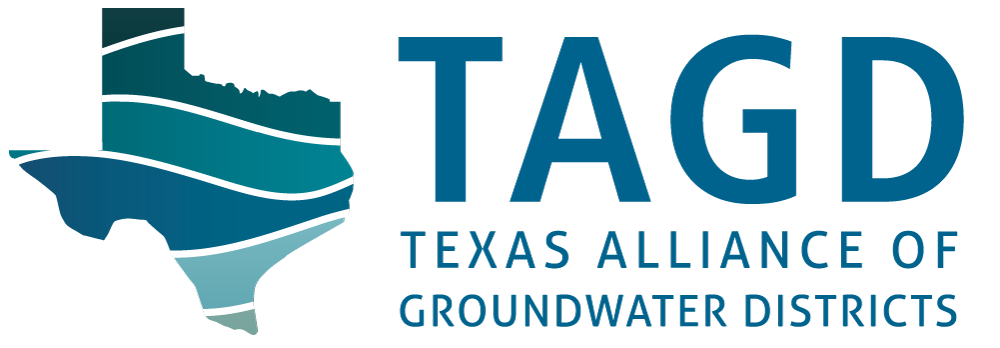Monthly Feature
Managing Through COVID-19: Texas GCDs Rise to the Challenge
Published 11/4/20 by Julia Stanford
Empty sports stadiums. “Zoom bombing.” Curbside pickup. Since the rise of the coronavirus pandemic in March, doing business has looked quite different for some folks, and that includes many groundwater conservation districts, or GCDs. In October, the Texas Alliance of Groundwater Districts (TAGD) surveyed its GCD members to understand how GCDs may have altered their operations in response to the pandemic. TAGD received survey responses from 68 districts, which informed this article.
Every GCD has made adjustments in response to the COVID-19 pandemic. From simple acts like distancing at meetings or offering hand sanitizer in the office, to more significant changes such as processing well permits virtually or adopting a remote work policy, GCDs across Texas have demonstrated their agility in adjusting to a fast-changing world all while maintaining effectiveness and transparency.

GCDs Have Widely Utilized Virtual Meetings and Maintained Transparency in the Process

All GCDs are managed by locally elected or appointed boards of directors who must meet at least four times each year, though many meet monthly. On March 16, 2020, Governor Greg Abbott issued an Executive Order that suspended certain provisions of Texas Open Meetings laws to allow governmental bodies to continue to conduct business through the use of telephone and video conferencing in order to protect staff, board members, and the public.
Of the 68 GCDs surveyed, over 75% have held at least one virtual or telephonic meeting during this time in a manner consistent with the specific requirements of the Executive Order. Similarly, all but three of the 16 GMAs (Groundwater Management Areas) have held at least one virtual meeting since March. This has allowed the GMAs to continue the important work of preparing Desired Future Conditions in advance of the upcoming joint planning cycle deadline.
In a time where attending meetings can mean spending hours in front of a computer, some entities are thinking outside the box – and outside of the conference room. Presidio County Underground Water Conservation District has taken some of their board meetings outside, setting up in a socially-distanced circle on the sprawling lawn of the Presidio County Courthouse in Marfa (left). GMA 7, comprised of 20 GCDs spanning 32 counties in West-Central Texas, held a meeting in September at the Caverns of Sonora Pavilion. The pavilion served as an open-air meeting venue that offered respite from the sun but plenty of space and air circulation for the comfort of GMA members, as well as the public in attendance.
When it comes to public participation, the majority of survey respondents reported that they saw just as much, if not more, engagement at their virtual board meetings and GMA meetings. This may have been in the number of participants, diversity of stakeholder groups represented, or amount of comments or questions from the public. Transparency and public involvement have always been at the forefront of GCD operations, and this demonstrates that even a pandemic can’t change that!
Virtual Meetings Pose Both Benefits and Challenges for GCDs
The quick and unpredictable pivot to virtual meetings certainly posed challenges to GCDs. Even the most tech-savvy participants found themselves trying to troubleshoot unanticipated technical issues on the fly. Reported challenges include internet bandwidth issues, an occasional pet or child hopping into view, background noise, competing priorities for remote workers, managing chat boxes, and microphone settings. These difficulties have made it tough for some to adjust to virtual meetings. However, many of the survey respondents reported virtual meetings are now running smoothly and efficiently.
Some GCD managers offered advice on what makes their virtual board meetings successful:
- Keep legal counsel involved
- Ask board and staff participants to turn cameras on when possible
- Provide clear instructions to the public to afford them ample opportunity to participate
- Offer individual training sessions and connection testing to mitigate any technical issues
- Direct board members not to deliberate matters utilizing the chat function
- Use the “mute” function to minimize audio feedback

A number of surveyed GCDs reflected that a significant benefit of virtual meetings is the financial and time savings that occur with reduced travel. GCDs also reported scheduling meetings has become easier when travel is not required. These benefits were widely reported in the context of joint planning meetings in particular, where members of some larger GMAs must travel up to three hours. Two GMAs specifically commented that it has also allowed for additional participation of GCD and GMA consultants at a fraction of the cost if travel were required to attend meetings. Some GCDs also reported that they have taken the opportunity to virtually participate in additional professional development opportunities or learn about other GMAs and GCDs through “attending” virtual meetings – something that would otherwise not have been possible.
Of course, virtual meetings are not the same as gathering in-person and do not provide the same social connection. Survey respondents widely reported missing the intangible benefits such as relationship building and impromptu conversations that are less accessible on a virtual platform. Like all of us, GCDs report looking forward to reconnecting with colleagues on a more personal level at in-person meetings and events when feasible.
GCDs Have Successfully Maintained and Modified GCD Operations
Survey results show that over 75% of GCDs changed the way they carry out groundwater management activities such as well permitting, water quality testing, water level monitoring, or education programs. For example, Hays Trinity GCD asked monitor well participants to opt in to on-site monitoring during this time in an effort to stay sensitive to the landowners’ distancing and contact preferences. Santa Rita UWCD, Mesa UWCD, and others developed or enhanced their ability to process permit applications or well registrations through e-mail and fax. Sutton County UWCD co-hosted a successful virtual Texas Well Owner Network (TWON) workshop by conducting water quality tests on samples submitted by participants and having TWON staff deliver an online presentation about interpreting the results. Many districts have added social distancing measures to any in-person interactions when taking well readings to monitor water levels.

With many schools shifting to online learning, many districts’ educational programs were suspended during the spring and summer months. A number of GCDs with educational programs report having modified their outreach strategy to keep reaching their stakeholders through virtual education programs and an increased social media and web presence. Several GCDs have delivered virtual groundwater education presentations to students who are learning remotely.
Brazos Valley GCD Education Coordinator Megan Haas has adapted the district’s educational offerings for distance learning. When schools book a presentation, she drops off supplies for the aquifer lab. Students attending school in-person are treated to a live video lesson as Megan walks the students through the hands-on lab. Students learning at home can get a similar experience using an interactive online course developed by the district on Nearpod, an online learning platform.
One of the most widespread impacts of COVID-19 has been to GCD office operations. 67% of survey respondents reported an office closure at some point since March. Many of those districts have now returned to normal office hours (66% of survey respondents) or appointment-only in-person visits (17% of respondents). About 40% of open GCD offices are currently requiring or recommending stakeholders to wear masks in the building and provide hand sanitizer upon entry. Of the districts not requiring or recommending masks for entry, nearly all are located in primarily rural areas, where low COVID-19 cases have led to many counties being exempted from Governor Abbott’s executive order that requires facial coverings

While GCDs are charged first and foremost to manage groundwater, districts must often manage people as well. For GCDs with four or more employees, all but one district reported that it utilized a remote working arrangement for employees at some point, or rotated employees in the office to minimize contact. The district that did not use either of those models reported that it already has a remote work policy in place, and all employees have the ability to work from home.

Whether their concerns are about virus exposure or caregiving responsibilities at home, employees working remotely or on a rotating basis in-office have a unique set of challenges. Some survey respondents shared benefits and disadvantages of remote working:
- It was very convenient when tasked with the role of caregiver or virtual teacher at home
- Some managers learned that certain positions do not require much time in-office
- Collaboration is more difficult as employees cannot simply step over to another’s office to discuss ideas
In light of these new circumstances, GCDs have emphasized that clear and concise communication with staff is necessary to ensure an efficient workflow.
GCDs Have New Tools to Use
A significant number of survey respondents expressed a desire that video and telephonic conferencing will remain an option and will be incorporated into Texas’ open meetings laws. This would allow districts to continue to utilize the virtual format as appropriate, even after the pandemic has passed. Others expressed eagerness for a full return to normalcy and in-person meetings. For now, nearly all GCDs plan on using a modified format for their next board meeting, whether that be by videoconference, social distancing at an in-person meeting, or a hybrid meeting with some attendees participating remotely.
After having quickly pivoted to a remote work situation with little to no advanced notice, a number of GCDs are using this opportunity to formalize remote work options for their employees. While a few districts already had remote work policies in place, several more have adopted or are in the process of adopting a formal remote work policy for their employees in response to COVID-19 situation.
Whether by phone, email, video chat, or a friendly face greeting you at a local office, Texas GCDs will always find ways to adapt to challenging circumstances. Even in the face of a pandemic, GCDs will continue their work to conserve, preserve, and protect groundwater resources while protecting private property rights and balancing the conservation and development of groundwater resources to meet the needs of this state.
